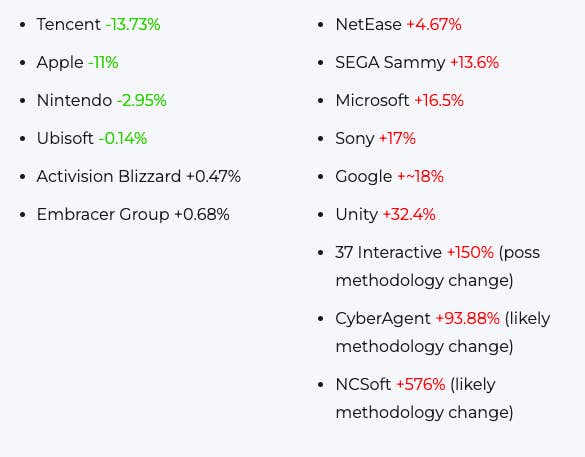Tencent, Apple, Nintendo, Ubisoft made most improvement on carbon reduction last year
Games industry still representing "the carbon footprint of a small country," AfterClimate says
Tencent, Apple, Nintendo, and Ubisoft reduced their carbon emissions from 2021 to 2022, while companies including Sega, NetEase, and Unity saw increases year-on-year.
That's according to AfterClimate's 2023 report, looking into the games industry's CO2 emissions for the year 2022, how they've evolved compared to the previous year, and progress against net zero targets.
Tencent was the company that achieved the most improvement, with emissions reduced 13.73% year-on-year, followed by Apple with a 11% drop, and then Nintendo at 2.95%, and Ubisoft at 0.14%.
On the flip side, Unity saw the biggest deterioration, with its carbon footprint increasing 32.4% in 2022. Google, Sony, and Microsoft followed with increases ranging between 16.5% and 18%.
You can see the screenshot below for the full list of reductions and increases, courtesy of AfterClimate, which highlighted the caveat that "that 2021 was a pandemic year of artificially low emissions leading to increases in 2022":

AfterClimate's report looked into environmental disclosures from 34 companies across tech (Apple, Google) and games, including the three platform holders, and big firms such as Ubisoft, EA, Activision Blizzard, Take-Two, Embracer Group, NetEase, Unity, and more.
Together, these companies disclosed over 81 million tonnes of CO2 emissions for 2022.
"A majority of this footprint comes from big tech companies Tencent, Sony, Microsoft, Google and Apple, but we are unable to estimate what share of their totals are game related at present," AfterClimate clarified.
"Even when these five companies are removed from the total, the remaining businesses disclosed over seven million tonnes for 2022. Our projections for the remainder who did not disclose suggests an absolute minimum for the total footprint of games business is over 14 million tonnes of CO2. It is clear that the games industry has the carbon footprint of a small country."
Countries that have lower emissions than the games industry include Bolivia, Greece, and Finland.
AfterCimate highlighted a number of companies that did not disclose their emissions or only partially disclosed them, including Square Enix, Epic Games, Supercell, Roblox, and Konami.
Similarly, only three games companies disclosed the footprint of their end users as part of their environmental reports: Embracer, Bandai Namco, and CD Projekt Red.
"This also means that the footprint of the global gaming audience remains virtually unknown," AfterClimate pointed out, encouraging the industry to further focus on that area.
Sign up for the GI Daily here to get the biggest news straight to your inbox

